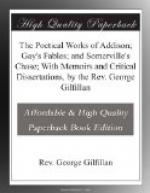In Ireland—although he sat as member for Cavan, and appears in Parliament to have got beyond his famous “I conceive—I conceive—I conceive”—(having, as the wag observed, “conceived three times and brought forth nothing"), and spoken sometimes, if not often—he did not feel himself at home. He must have loathed the licentious and corrupt Wharton, and felt besides a longing for the society of London, the noctes coenoeque Deum he had left behind him. It was in Ireland, however, that his real literary career began. Steele, in the spring of 1709, had commenced the Tatler, a thrice-a-week miscellany of foreign news, town gossip, short sharp papers de omnibus rebus et guibusdum aliis, with a sprinkling of moral and literary criticism. When Addison heard of this scheme, he readily lent his aid to it, and then, as honest Richard admits, “I fared like a distressed prince who calls in a powerful neighbour to his aid,—I was undone by my auxiliary.” To the Tatler Addison contributed a number of papers, which, if slighter than his better ones in the Spectator, were nevertheless highly characteristic of his singular powers of observation, character-painting, humour, and invention.
In November 1709, he returned to England, and not long after he shared in the downfall of his party, and lost his secretaryship. This also is thought to have injured him in a tender point. He had already conceived an affection for the Countess-Dowager of Warwick, who had been disposed to encourage the addresses of the Secretary, but looked coldly on those of the mere man and scribbler Joseph Addison, who, to crown his misfortunes at this time, had resigned his Fellowship, suffered some severe pecuniary losses of a kind, and from a quarter which are both obscure, and was trembling lest he should be deprived of his small Irish office too. Yet, although reduced and well-nigh beggared, never did his mind approve itself more rich. Besides writing a great deal




